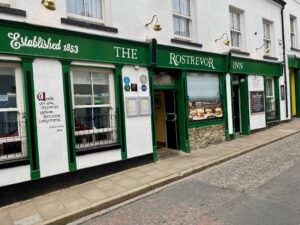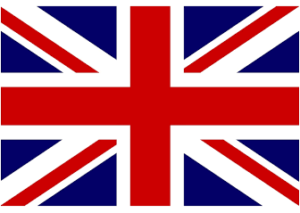It took a while for me to understand the irony of booking a room in the Rostrevor Inn in County Down, Northern Ireland for the 4th of July. It’s a homey sort of place and one of the oldest hotels in Northern Ireland. The original was built by the Ross family in 1761. I figured my old friend Joe Shea would be happy to hoist a few pints there to celebrate American Independence Day as he lives right down the road in Killkeel. In fact, the Rostrevor Inn was the place he took me for dinner when we first got together two years ago.
Joe and I had been good friends in high school and college, but he moved away to Ireland, and we didn’t see each other for 40 years. When I moved here, we connected again. Now we get together several times a year.
My wife and kids are in the States for the summer. And I had already cooked an Independence Day barbecue at the start of the weekend since rain was predicted on the 4th. So the quiet holiday Sunday seemed like a fine time to drive up north to County Down to have drinks and dinner with Joe.
I drive to Northern Ireland often, and its always been a pleasant trip. Yes, tensions can run high around the marching season. Bonfires on the night of July 11 and parades on Orangemen’s Day, July 12 are held to celebrate the 1688 military victory of Protestant William of Orange over James II, the last British Catholic monarch.
According to the press, Unionist anger over the Brexit arrangement called “the Northern Ireland Protocol” may inspire more rancor than usual during this year’s marching season.
But none of this crossed my mind when I set off for Northern Ireland on the morning of the 4th of July. On a sidetrip to Killkeel to visit the famous KWM wine shop, I was jolted by the red, white and blue bunting and Unions Jacks hanging over the main streets. It was a funny thing to see British flags instead of the Stars and Stripes flying on the 4th of July.
The irony of celebrating American Independence Day in the U.K. was slowly dawning on me. It came into sharp focus later that evening.
We had a lovely dinner at the Rostrevor Inn–the sea bass was excellent and so was the Sancerre. But on a trip to the men’s room, I read some text hanging on the hotel wall that recounted the history of the hotel and the family that owned it. It read, in part:
In 1814, a famous dinner was hosted at the “Rosstrevor-Inn” to celebrate General Ross’s victory at Bladensburg, which in turn led to the burning of the White House and the events that resulted in the writing of the Star Spangled Banner.
Huh. Wait a minute. We were celebrating the 4th of July in the same hotel where they celebrated the burning of the White House by British forces in 1814–at the hands of a Northern Irish general?
We took a walk after dinner down the coast road, where Joe pointed out the spire of the Ross Monument. General Robert Ross commanded the British forces during the War of 1812. Francis Scott Key had gone to see him about releasing a prisoner when Key witnessed the shelling of Fort McHenry from the deck of a British warship–the events recounted in the national anthem.
The placard on the roadside said that the monument is built on the land where Rostrevor native son General Robert Ross planned to build his retirement home had he survived the war. Instead he was shot off his horse by a teenage American sharpshooter and died in Baltimore.
I mulled over the odd mash-up of British, Irish and American history. What a wacky place I had chosen to celebrate the holiday. In a little park on the shore of Carlingford Lough, not far from the Ross Monument, Joe and I sang the Star Spangled Banner at the top of our lungs.
It seemed like the thing to do.



